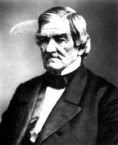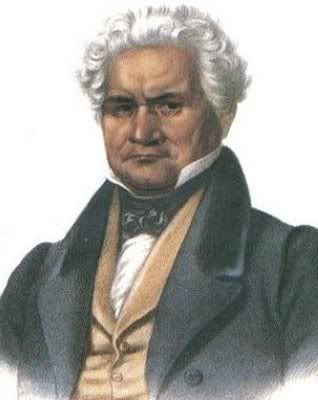John Ross
Coowescoowe , The Egret
( Cherokee )
1790 - 1866. Born along the Coosa River at Tahnoovayah, Georgia. John Ross, who would become the founder of the constitutional government among the Cherokees, was the third of nine children. His father was Daniel Ross, a Scot and his mother was Mary (Molly) McDonald, a Scot-Cherokee woman. As a youth he was called Tsan-usdi or "Little John".
Although brought up with other Cherokees, Ross was educated at home by white tutors, continuing his education at Kingston Academy in Tennessee. Although he was only about one-eighth Cherokee, Ross always identified himself as Cherokee and was married in 1813 to "Quatie" or Elizabeth Brown Henley, a full-blooded Cherokee. They had five children.
Ross began his political career in 1809 when he went on a mission to the Arkansas Cherokees. By 1811, he was serving as a member of the standing committee of the Cherokee Council. In 1813-1814, he was an adjudant in a Cherokee regiment under the command of General Andrew Jackson and saw action with other Cherokees at Horseshoe Bend in 1813 against the Red Sticks commanded by William Weatherford. Ross led a contingent of Cherokees warriors in a diversionary tactic and thus was an important factor in Jackson's success at Horseshoe Bend.
In 1814, shortly after his marriage, Ross set up a ferry service and trading post at Ross's Landing. In 1817, he became a member of the Cherokee National Council; he served as president of the national council from 1819 to 1826. In 1820, the Cherokee people instituted a republican form of government similar in structure to that of the United States. As an advocat of education and missionization among his people, Ross thought that the Cherokees might become a state in the union with its own constitution. When New Echota became the Cherokee national capital in 1826, he moved there with his family. In 1827, he became president of the Cherokee Constitutional Convention, which drafted a new constitution. From 1828 to 1839, Ross served as principal chief of the Cherokee nation under this new constitution.
During Ross's years as chief, he opposed federal and state encroachments on tribal lands. He resisted Georgia's contention that the Cherokees were mere tenants on state lands. When Georgia stripped the Cherokees of their civil rights between 1828 and 1831, Ross took their case to the Supreme Court and won, but President Andrew Jackson violated his oath of office by defying the Supreme Court when he refused to enforce its decision. With the discovery of gold near Dahlonega, Georgia, in the 1820s, white officials pressed for the relocation westward of the Cherokees along with other eastern American Indians. Jackson also signed the Indian Removal Act of 1830, which provided for the relocation of eastern tribes in an area west of the Mississippi that would become Indian Territory.
Although Ross continued to resist removal policies as principal chief of the Cherokees,a dispirited minority of Cherokee leaders called the Treaty Party (including Major Ridge, John Ridge, Elias Boudinot, and Stand Watie) consented to removal by signing the Treaty of New Echota in 1835. Ross and a majority of the Cherokees sought to have the treaty reversed and sent a letter to Congress in 1836 asking for investigation into its legality.
Although Ross continued to protest removal for three more years, Georgia started to coerce the Cherokees into selling their lands for a fraction of their real value. Marauding whites plundered Cherokee homes and possessions and destroyed the Cherokee Phoenix's printing press because it opposed removal. The army forced the Cherokee families into internment camps to prepare for the arduous trek westward. As a result of unhealthy and crowded conditions in these hastily constructed stockades, many Cherokees died even before the 'Trail of Tears' began. While failing in his efforts to stop removal, Ross managed to gain additional federal funds for his people.
During the internment of the Cherokees in Georgia and the two disastrous trips along the Trail of Tears, over four thousand (4,000 !) Cherokees died of exposure, disease, and starvation - about a quarter of the total Cherokee population. Quatie, Ross's wife, was among the victims of this forced emigration. After removal, the miserable conditions did not cease; many Cherokees died after they arrived in Indian Terretory as epidemics and food shortages plagued the new settlements.
Upon his arrival in Indian Terretory, Ross joined the Western Cherokees who had moved several years earlier. He aided in the drafting of the constitution for the United Cherokees and served as its head from 1839 until his death in 1866. In 1839, with the assassination of the Ridges and Boudinot in retaliation for their role in signing the removal treaty, tribal factions became polarized, and some of the proponents of the Treaty Party claimed that Ross had a role in the assassinations, but they never produced any evidence. Sequoyah, the originator of the Cherokee alphabet, and other peacemakers sought to reconcile the factions within the tribe. In 1844, Ross married a Quaker woman named Mary Bryan Stapler and they had three children. Between 1839 and 1856, he went to Washington five times seeking justice for his people.
Although Ross was a large slaveholder when the Civil War began, he opposed a Cherokee alliance with the Confederacy. Instead, he advocated Cherokee neutrality. Many of Ross's supporters were nonslaveholding Cherokees. By summer 1861, many influential leaders, including Stand Watie, favored joining the Confederacy. Ross convened a national conference and was overruled by the pro-Confederacy forces. By 1862, federal troops had regained control over most of Indian Territory, so Ross moved his wife and family to Kansas. As a result, Ross was deposed from office and the Cherokees repudiated their ties to the Confederacy in 1863. But the Southern Cherokees under State Watie formed a seperate government that still allied with the Confederacy. Faced with such tragic divisions, Ross went to Washington to tell President Abraham Lincoln about the rebellious Southern Cherokees.
At the end of the Civil War, the Cherokees were deeply split. Ross, at seventy-five and in bad health, journeyed to Washington as the head of the Northern Cherokees for new treaty negotiations that sought to protect the Cherokees and their constitution. He died while in Washington on August 1, 1866, during negotiations. His body was returned to Indian Territory and he was buried at Park Kill, Oklahoma.
Major Ridge
Kah-nung-da-tla-geh
( Cherokee )
Kah-nung-da-tla-geh, "the man who walks the mountain top", was known as "The Ridge" and later Major Ridge, for his participation in the Creek War 1813-1814. He was the leader of the Ridge or Treaty Party. His brother, Oo-wa-tie, "the ancient one", was the father of Stand Watie. He served as head of the Lighthorse Guard (i.e., Cherokee police), member of the National Committee, and speaker of the National Council. The valuation of his property at the time of the removal west showed him to be the third richest man in the Cherokee Nation. He was assasinated in 1839 for signing the Treaty of New Echota for removal of the Cherokees to the West.
Standing Turkey
Kanagagota
( Cherokee )
Kanagagota was major chief of the Cherokee who was known to the british as "Old Hope of Chote". He visited England in 1762 with a delegation of Cherokee. This portrait above was entiteled "Cunne Shote" which was totally wrong, because it was only a part of the chiefs name and "Echota" which was the Cherokee's Capital. Year of birth and death are not known. He always tried to have good relationship with the english. The Cherokee had a contract with them, but it led to war when in 1759 31 chiefs went to Charles Town to unsharpen the bad situation between the english and the Cherokee. They were arrested. Some of them were set free but in return other Cherokee were arrested and then killed, and this meant war. The war went on until 1761 where a new Governor ended it.
© 2025 Created by LadyHawkღ.
Powered by
![]()


